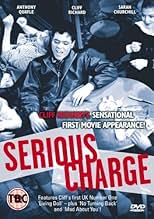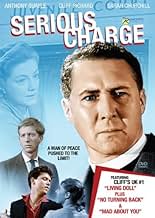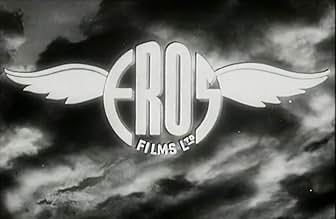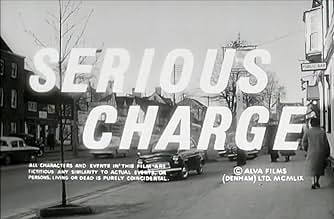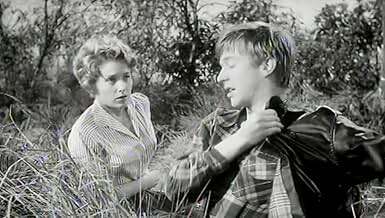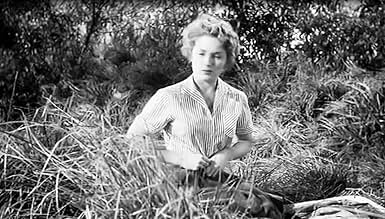Adicionar um enredo no seu idiomaA vicar falsely accused of assaulting a youth attempts to prove his innocence and save his reputation.A vicar falsely accused of assaulting a youth attempts to prove his innocence and save his reputation.A vicar falsely accused of assaulting a youth attempts to prove his innocence and save his reputation.
- Direção
- Roteiristas
- Artistas
Jess Conrad
- Dancer
- (não creditado)
Marie Devereux
- Sexy Girl in Coffee Bar
- (não creditado)
Carol Dourof
- Dancer
- (não creditado)
- Direção
- Roteiristas
- Elenco e equipe completos
- Produção, bilheteria e muito mais no IMDbPro
Avaliações em destaque
I was surprised at how much I enjoyed this film. Superb performance from Anthony Quayle, as you would expect, and from the woman playing Hester. The plot is ahead of it's time and not what you'd expect from 1959. The story is a good one, well told, well paced, with excellent performances. The film has aged well, perhaps with the exception of the portrayal of the youngsters which seemed dated and cliched.
However I did smile that the vicar played top level football on a Saturday (the equivalent of today's Premier League) without training during the week, totally unnecessary to the plot and completely unbelievable! Cliff Richard's performance of Living Doll adds curiousity value. Another lost gem from Talking Pictures TV.
However I did smile that the vicar played top level football on a Saturday (the equivalent of today's Premier League) without training during the week, totally unnecessary to the plot and completely unbelievable! Cliff Richard's performance of Living Doll adds curiousity value. Another lost gem from Talking Pictures TV.
An unmarried vicar in a new parish (Quayle) accuses a local 19 year old of being partially responsible for the death of a teenage girl. In defiance, the young man claims the vicar molested him. Out of spite, his story is backed up by a local woman (Churchill) still furious that the vicar rejected her advances. Unfortunately for the vicar, the woman is a highly respected member of the community - her father is the previous clergyman.
Given that this film was released in 1959, its subject matter is pretty ground-breaking, especially for a British film. Yes, the depiction of disaffected youth hanging around coffee bars, breaking into swimming pools and grooving to Cliff Richard's Livin' Doll is a little clumsy (Richard is asked to do little in a secondary role other than sulk or croon), but in an era when folks weren't supposed to know about homosexuality (at least in the movies), this is quite a daring story, and occasionally quite subversive. We the audience are ever so slightly encouraged to wonder about Quayle's sexuality as he spurns the advances of a good churchy woman, seems oblivious to his sexy young French maid (!) and looks up to his strident mother (a wonderfully knowing performance by Irene Browne). Judith Furse's probation officer is also deliciously ambiguous...
So quite a grown up film then - a shame that these days it's probably only known for being Cliff's debut film.
Given that this film was released in 1959, its subject matter is pretty ground-breaking, especially for a British film. Yes, the depiction of disaffected youth hanging around coffee bars, breaking into swimming pools and grooving to Cliff Richard's Livin' Doll is a little clumsy (Richard is asked to do little in a secondary role other than sulk or croon), but in an era when folks weren't supposed to know about homosexuality (at least in the movies), this is quite a daring story, and occasionally quite subversive. We the audience are ever so slightly encouraged to wonder about Quayle's sexuality as he spurns the advances of a good churchy woman, seems oblivious to his sexy young French maid (!) and looks up to his strident mother (a wonderfully knowing performance by Irene Browne). Judith Furse's probation officer is also deliciously ambiguous...
So quite a grown up film then - a shame that these days it's probably only known for being Cliff's debut film.
This was the first film to deal with homosexuality in British cinema, and it is absurd as there is not one homosexual character in it. I say this, and without spoilers, that the Vicar might be, well, repressed but it is all such a muddle I ended up not caring. But disregarding this the acting is not bad and Anthony Quayle, Sarah Churchill and especially Irene Browne are excellent. Irene Browne, the Vicar's mother has the best lines in the film, and her voice alone commands attention. I will just say that the vicar falls into troubled waters and there is an attempt at showing homophobia and the human havoc it can cause. Andrew Ray attempts being convincing as a juvenile delinquent ( very attractive to 1950's audiences ) but of course to be disapproved of. Cliff Richard improbably plays another delinquent and ridiculously stops the film by singing ' Living Doll ' which was a hit at the time. All this sounds as if I do not like watching it, and that is not true. When I feel low I watch it just for the acting, and its enjoyable absurdity. And even Sarah Churchill transforms herself from being prudish, sexually repressed and drab into one of the best ( elegant ) seducers on film. I like watching her in anything. See it and smile and remember that this really is an imitation of life. I give it just 5 because the actors save the film from poor direction and an awful musical soundtrack.
Very daring for its day (1959) "Serious Charge" may now look very much like a period piece yet this British movie about a vicar falsely accused of molesting a teenage boy still packs a punch thanks in large part to a fine script by Guy Elmes and Mickey Delamar and good performances from Anthony Quayle as the vicar, Andrew Ray as the boy who makes the allegation, Sarah Churchill as the woman who has the hots for Quayle and, perhaps best of all, Irene Browne as Quayle's no-nonsense mother. It was also the film that introduced a young Cliff Richard to the big screen as Ray's younger brother, (he sings "Livin' Doll"). Now Cliff and the teenage teraways are the films weakest links which in all other respects treats its subject seriously and with a surprising degree of intelligence. It's almost unimaginable that a similar film would have been made in America at this time.
Intriguing British drama about a priest, underplayed brilliantly by Anthony Quale, who also is a bit of a local football hero, tries to bring redemption to the local teddy boys, this being 1959, and appears to avoid women like the plague, the implication being, is he gay or not? It all comes to a head when the main thug, played by Andrew Ray, gets a girl pregnant, and after a tragic accident, is confronted by Quale who is then falsely accused of 'interferring' with Ray, a quaint 1950's way of saying he molested him. Sarah Churchill, who is perhaps a bit old for her role, she was in her mid 40's at the time, holds the key to his innocence in the matter and eventually it all plays out but we are left wondering still, was he supposed to be gay or not? I don't think we were meant to really know as it was 1959 and mainstream films only ever dropped hints back then. At one point, Percy Herbert, playing Andrew Ray's violent father says, ' We haven't got one of them in the parish have we?'. Apparently back then, it was alright to beat the hell out of your son with a strap, backed up by the local copper, but not to be gay, clearly a despicable state of being then. Nevertheless, very interesting to compare how things have changed, and I do remember when people thought like this, but best of all, a wonderful performance by Anthony Quale who hold the film together with some otherwise dodgy performances, like Cliff Richard's first acting role.
Você sabia?
- CuriosidadesThe song, "Living Doll" by Cliff Richard and The Shadows (as The Drifters) was released as a single (in a different arrangement) as a spin off from this film. It was a British #1, and was the top-selling song of 1959.
- Citações
Mrs. Phillips: Now, do let's sit down, Hester. You're taking to another woman, not one of those helpless males who can't discuss anything important or private without staring out of a window or looking confused.
Hester Peters: I don't wish to be rude...
Mrs. Phillips: You can, my dear, because I'm going to be extremely rude to you.
- ConexõesFeatured in A Bit of Scarlet (1997)
- Trilhas sonorasLiving Doll
by Lionel Bart
Cliff Richard song
Accompanied by The Shadows (as The Drifters) (uncredited)
Principais escolhas
Faça login para avaliar e ver a lista de recomendações personalizadas
Detalhes
- Tempo de duração
- 1 h 27 min(87 min)
- Cor
- Proporção
- 1.37 : 1
Contribua para esta página
Sugerir uma alteração ou adicionar conteúdo ausente

